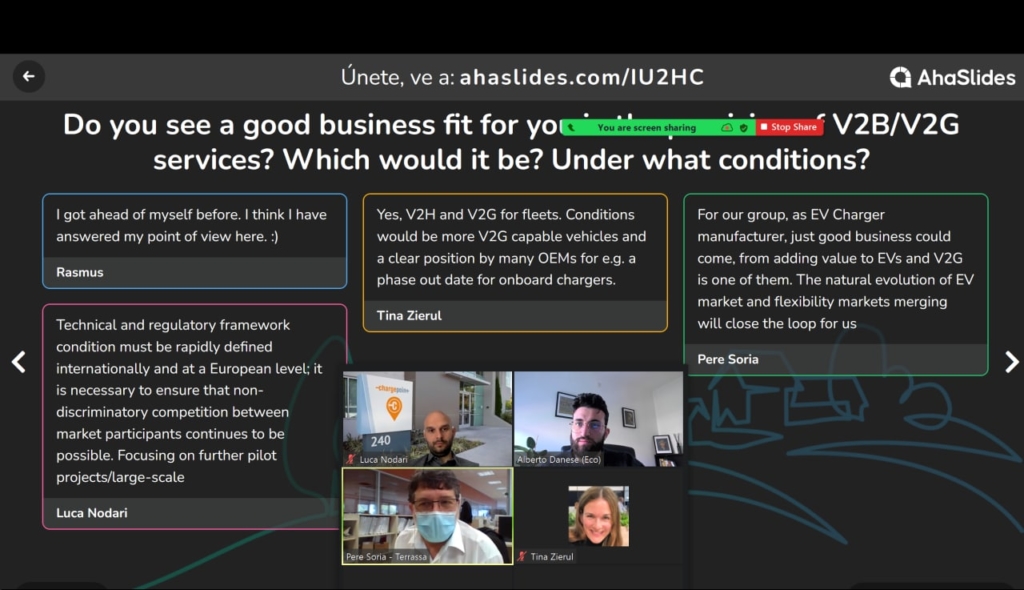This information will be used by the V2Market project to identify ways through which to make Vehicle-to-Building (V2B) and Vehicle-to-Grid (V2G) services affordable, accessible, and beneficial to all. Simultaneously, it will showcase and quantify how V2B/V2G can boost environmental sustainability and emerge as an economically profitable business opportunity for electric vehicle (EV) owners, fleet managers, energy retailers, grid operators, energy communities, ESCos and aggregators.
The V2M, a Horizon 2020 project to incorporate electric vehicle batteries into the electricity system as storage and flexibility capacity, is taking off. As part of the project, coordinated by Ecoserveis, an advanced market study to assess and identify potential pathways to commercialise the joint use of V2B and V2G services has just been concluded. For this purpose, extensive qualitative research was conducted to document the views, interests and needs of various actors involved in the promotion and usage of sustainable mobility (e.g., electric vehicle drivers, energy retailers, manufacturers, aggregators).
This market study was conducted with a twofold goal. First, to evaluate ways through which to make V2B/V2G services accessible and affordable to all European citizens. Second, to identify and further enhance the contribution to environmental sustainability of integrating EVs into the electric grid, as well as its potential to emerge as a sound business model.
Four Focus Groups
To collect this information, throughout March 2022 Ecoserveis led four focus groups: a qualitative research method that brings together a group of participants knowledgeable about a topic of interest and exposes them to a set of questions. In this way, focus groups provide a range of different answers to a same question, and also allows researcher to observe relations between participants and to better understand differences among them.
These four focus groups gathered participants from across Europe, both on-line and in-person. One of them targeted specifically EV owners and users: key actors whose involvement in the integration of V2B and V2G will be decisive for vehicle batteries to be able to assist the grid in reducing their intake of fossil fuel energies, and to solve grid congestions, hence mitigating the risk for spike in energy prices.
The second and third focus groups gathered a diverse range of experts such as car and V2G manufacturers, e-mobility innovation consultants, researchers, and legal advisors, which sought to collectively find opportunities to make V2B/V2G accessible and profitable in Spain and in the European Union. Finally, the fourth focus group featured potential aggregators, which explained their prerequisites to operate as aggregators of flexibility through V2B/V2G.
The analysis and study of all the information gathered led to the following findings.
Firstly, the EV owner population in Europe today is primarily constituted by middle and high-income individuals, who are notably environmentally aware and technology-savvy. To motivate this segment of the population, the assurance of technical reliability, the non-disruption of daily habits, and of contributing to environmental sustainability would be stronger drivers, than modest economic profits would be.
Secondly, all focus groups identified current national legal frameworks as a barrier to the large-scale implementation of V2B/V2G: today’s regulation is not well-suited to facilitate the deployment of these innovative technologies, becoming a deterrer. Especially, the lowering of the minimum amount of energy required for aggregation was strongly highlighted, as it would allow the formation of local flexibility markets, necessary to extend widely the use of V2B/V2G.

Thirdly, several profiles were singled out as key end-users to benefit from V2B/V2G. Households owning PV plants would greatly benefit from V2B/V2G: it would allow them to avoid peak prices, power their house via their car, and to not need a local battery for energy storage. Likewise, operators of large or heavy-duty fleets, with regular mobility patterns and long-stopovers would have a tremendous flexibility capacity, allowing them to profit greatly form V2B/V2G.
Fourthly, EVs and bidirectional chargers are high-cost products, mainly inaccessible to the low-income strata, and to the youth. To make V2B/V2G more accessible and widely used, sustainable mobility experts, and EV owners themselves proposed a range of solutions, such as pay-per-use car renting with V2B/V2G, or servitisation schemes with permanency contracts.

EV owners focus grup at the Eroica Cafè (Barcelona).
Finally, alongside schemes to make V2B/V2G more accessible to EV owners, the focus group findings illuminate that other actors will also need incentives, financial support or the development of enabling regulation for them to profit from flexibility services from EV aggregation. For instance, distribution companies will need to upgrade and digitalize the grid, and energy retailers may only establish contracts with external aggregators should it be legally established that their operations shall not entail problems in deviation management.
Building on these conclusions, after the market study, the project plans to test the V2B/V2G scheme in a pilot site in the Barcelona Metropolitan Area. Altogether, these activities are aimed at developing the market framework conditions to mainstream V2G and V2B services in the electricity markets of Europe.
After the market study, the project plans to include a pilot site in the Barcelona Metropolitan Area and the creation of new financial resources and business models. All these activities aim to develop the market framework conditions to mainstream Vehicle-To-Grid (V2G) and Vehicle-To-Building (V2B) services in the electricity markets.
Find out more about the project on the website or on social media.